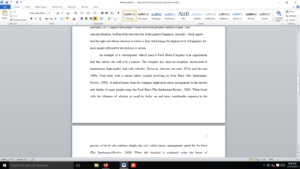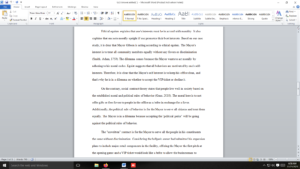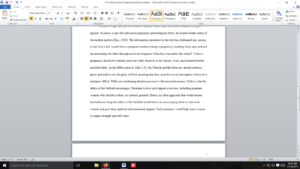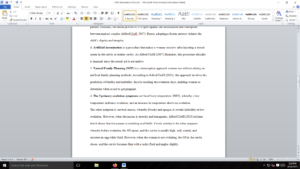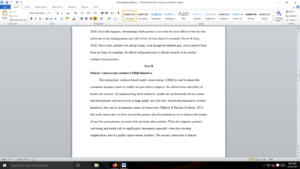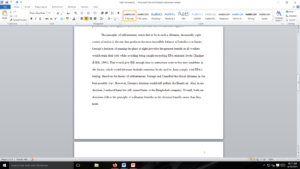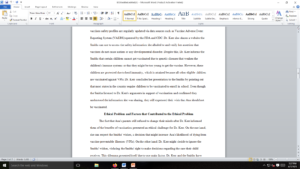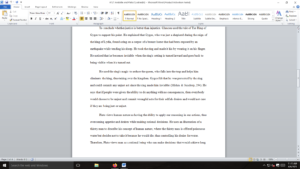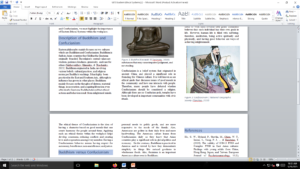In this assignment, you will research and become familiar with codes of ethics that guide your work.
Access your state’s code of ethics for the education profession and the national Code of Ethics.
If you are not a teacher, find the most appropriate code of ethics for your professional area, such as the American Telemedicine Association, or the Association for Educational Communications and Technology.
To complete the assignment, you will determine the appropriate and legal courses of action in response to three case studies as stated below but more detailed in the syllabus.
Part I – Be sure to read the details of the cases described and answer the questions accordingly. State the name of the case, then write a narrative addressing the questions.
- Summarize the main legal and ethical components from the national, state,and professional codes of ethics in a brief, but informative narrative that includes a discussion of the following focal questions.
- Who or what is the educator’s primary concern?
- How can the educator strive to achieve and sustain the highest degree of ethical conduct?
- What are the types of behaviors (e.g., bullying,child abuse,etc.) that the educator should
report to administration?
- What are the reasons for suspension of a professional?
Review and respond to the following case studies within the context of the codes of ethics:
Case Study 1:You are a high school social studies teacher and one of your students has come to you upset that one of the other students in class has been sending him threatening emails and
pornographic photos during a class group project. According to the ethics codes and district faculty
policies, what should be your plan of action for addressing this issue?
Use the Web sites below, or review your state and district policies as a basis for developing your plan of action, noting references to state and/or district policies as appropriate.
Kidpower
https://www.kidpower.org/library/article/cyber-bul…
Stop Bullyinghttp://www.stopbullying.gov/cyberbullying/
Case Study 2: All teachers in your school have a laptop to use in their classrooms and for
instructional planning at home. When the computer was delivered, you briefly reviewed the district
policies during a departmentalmeeting; however, during the past six months, several teachers have
been questioned about their Internet and e-mail use with these laptops.You realize that you must use school property appropriately.Based on the ethics codes and district faculty policies, what should be your plan of action for using the laptop?
Use the Web sites below or review your state and district policies as a basis for developing your plan of action.
Broward County, Florida
Policy 5306 – Schooland Technology Usage
http://www.broward.k12.fl.us/sbbcpolicies/docs/P53…
Generated: 5/5/2018 Page 4 of 13
Miami Dade County, Florida
Policy 7540.01 – Technology Privacy
http://www.neola.com/miamidade-fl/search/policies/...
PalmBeach County, Florida
Policy 3.29 – Acceptable Use of Technology by Employees
http://www.schoolboardpolicies.com/p/3.29
Case Study 3: As a new high school teacher, you are assigned to teach an intensive reading class in which three students are consistently not showing progress. After reviewing the students’ records
(e.g.,academic achievement progress in other courses,attendance and disciplinary records,
intervention plans and other test scores,and state standardized test scores) you develop highly
effective instructionalstrategies using technology for meeting these students’ learning needs. Since
your instructionalapproach has proven to be so successful, several teachers approached you with
sharing the students’ background information,as wellas your instructionalstrategies. You are
concerned about infringing on the students’ privacy rights; consequently, you develop a plan of action to address the teachers’ requests, but also address student records concerns.
Part II – Finally, reflect on the application of one case study to your school responsibilities. What must you do to avoid this type of professional and ethical conflict in the future?
Identify and describe three additional resources for use by those in your profession who wish to
avoid professional and ethical conflicts Ethics.
This is for my wife. She is a Kindergarten teacher at North Gulfport Elementary in Gulfport MS.
This is the syllibi. This is Assignment 3 on the it.
Answer preview
As a high school social studies teacher, one of my students approached me and pointed out that one of the other students in the class has been sending him pornographic photographs and threatening emails when undertaking a class group project. As an educator, the NEA code of ethics requires me to strive to assist all students in realizing their potential as effective and valuable members of society (NEA, 2020). To meet this obligation, I have to make all reasonable efforts to protect my students from harmful conditions that might impede their learning or those threatening their health and safety (NEA, 2020). Sending threatening emails and sharing unsolicited pornographic photos is tantamount to cyberbullying.
[1829 Words]
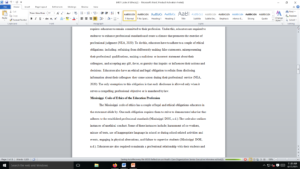
The education profession and the national Code of Ethics
